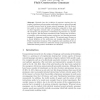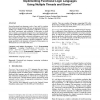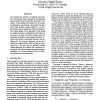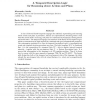36 search results - page 6 / 8 » Feature Logic with Disjunctive Unification |
EELC
2006
14 years 1 months ago
2006
Research into the evolution of grammar requires that we employ formalisms and processing mechanisms that are powerful enough to handle features found in human natural languages. Bu...
ICFP
2004
ACM
14 years 9 months ago
2004
ACM
Recent functional logic languages such as Curry and Toy combine lazy functional programming with logic programming features including logic variables, non-determinism, unification...
IJCAI
2003
13 years 11 months ago
2003
We consider the problem of updating nonmonotonic knowledge bases represented by epistemic logic programs where disjunctive information and notions of knowledge and beliefs can be ...
JAIR
1998
13 years 9 months ago
1998
A class of interval-based temporal languages for uniformly representing and reasoning about actions and plans is presented. Actions are represented by describing what is true whil...
IJCAI
2007
13 years 11 months ago
2007
A formula in first-order logic can be viewed as a tree, with a logical connective at each node, and a knowledge base can be viewed as a tree whose root is a conjunction. Markov l...




